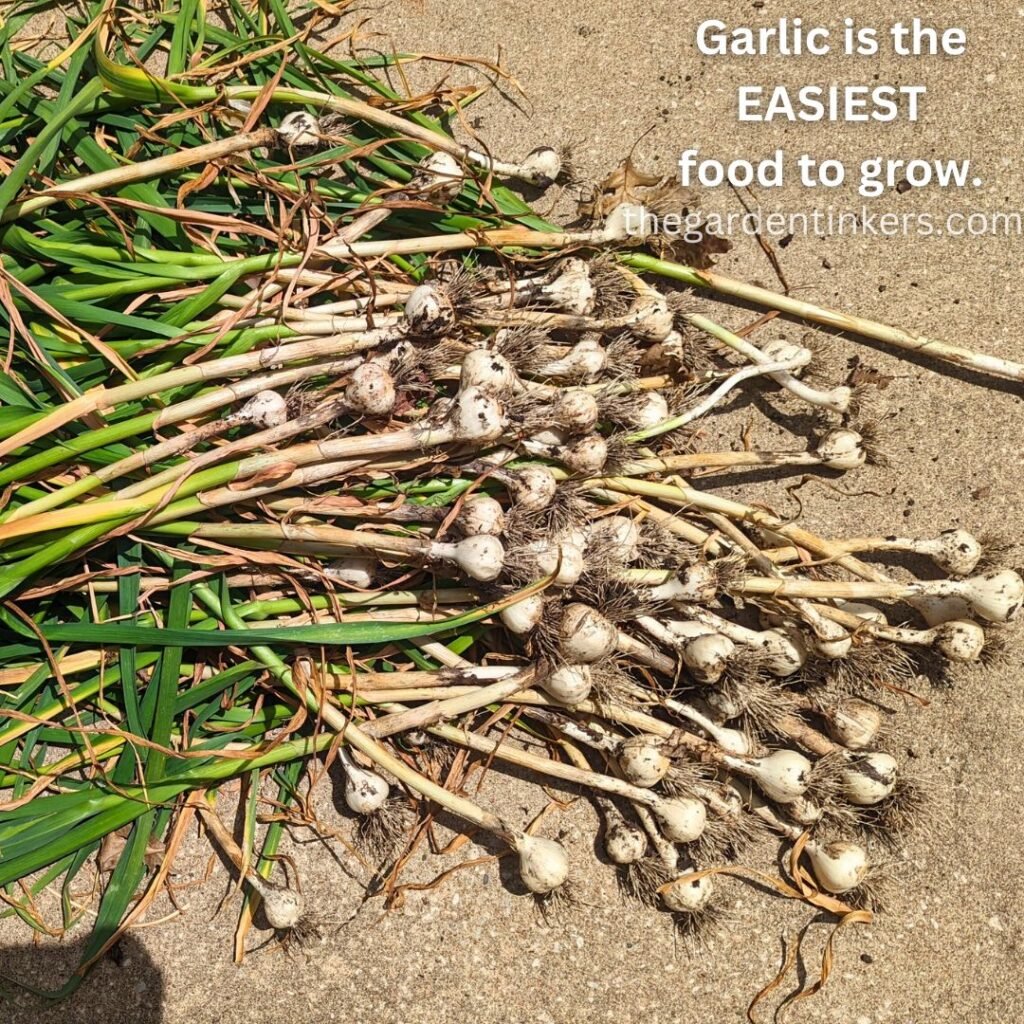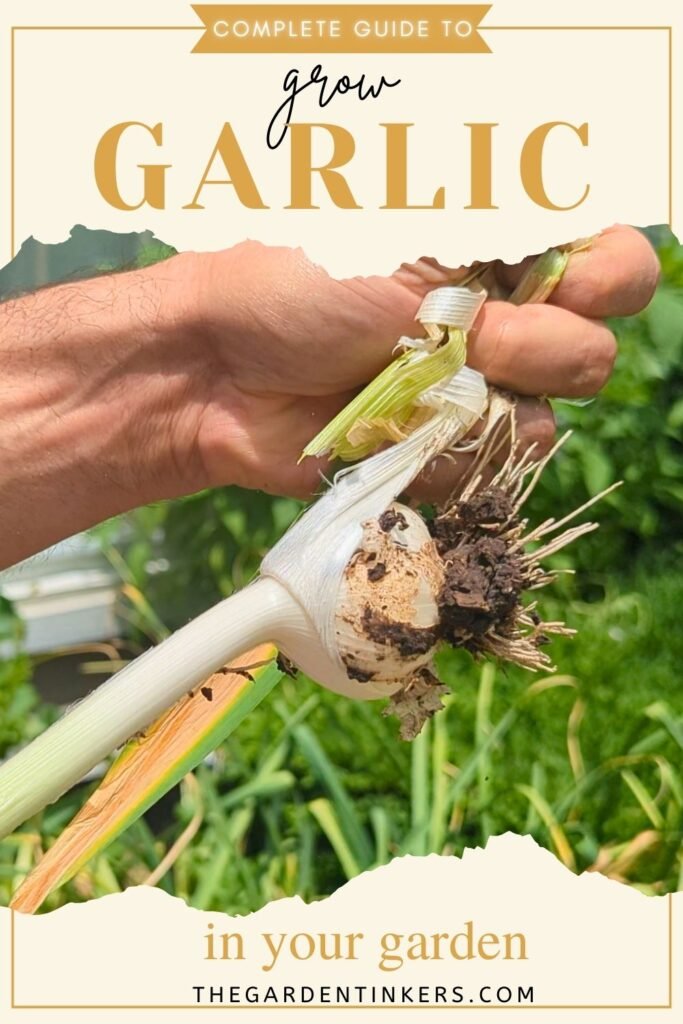We started growing garlic 4 years ago, and we are self-sufficient in it for past 2 years. In this post we are sharing everything you need to know about how to grow garlic in your own garden. It is one of the easiest foods to grow!
This post may contain affiliate links. If you choose to shop with these links, this blog may earn a small commission at no extra charge to you. Thank you for supporting this blog. Please refer to our privacy policy page for more details.
How to grow garlic?
Begin with picking the correct variety for your region. Refer to the list of varieties at the end of this blog post to pick the one best for your state.
The next most important thing is to focus on the soil. Prepare the soil by adding compost or an organic balanced fertilizer. Know that garlic is a bulb, so keeping the soil well drained will go a long way.
Planting garlic at the correct time is essential. Fall is when you must plant it for a great harvest in summer.
To grow large sized garlic bulbs, fertilize it in spring to give the plants a boost.
Finally, learn the best way to store garlic, so that you can use it for next few months.
How do I PLANT garlic?
Follow these steps to plant garlic.
- Dig 2 inches deep holes, at least 2 inches apart from each other.
- Place one garlic clove in each hole, the pointy side should be up towards the sky, and the blunt side should be downwards towards the dirt. See the image below for clear reference.
- Once all bulbs are planted, cover the holes back with dirt and let it grow.
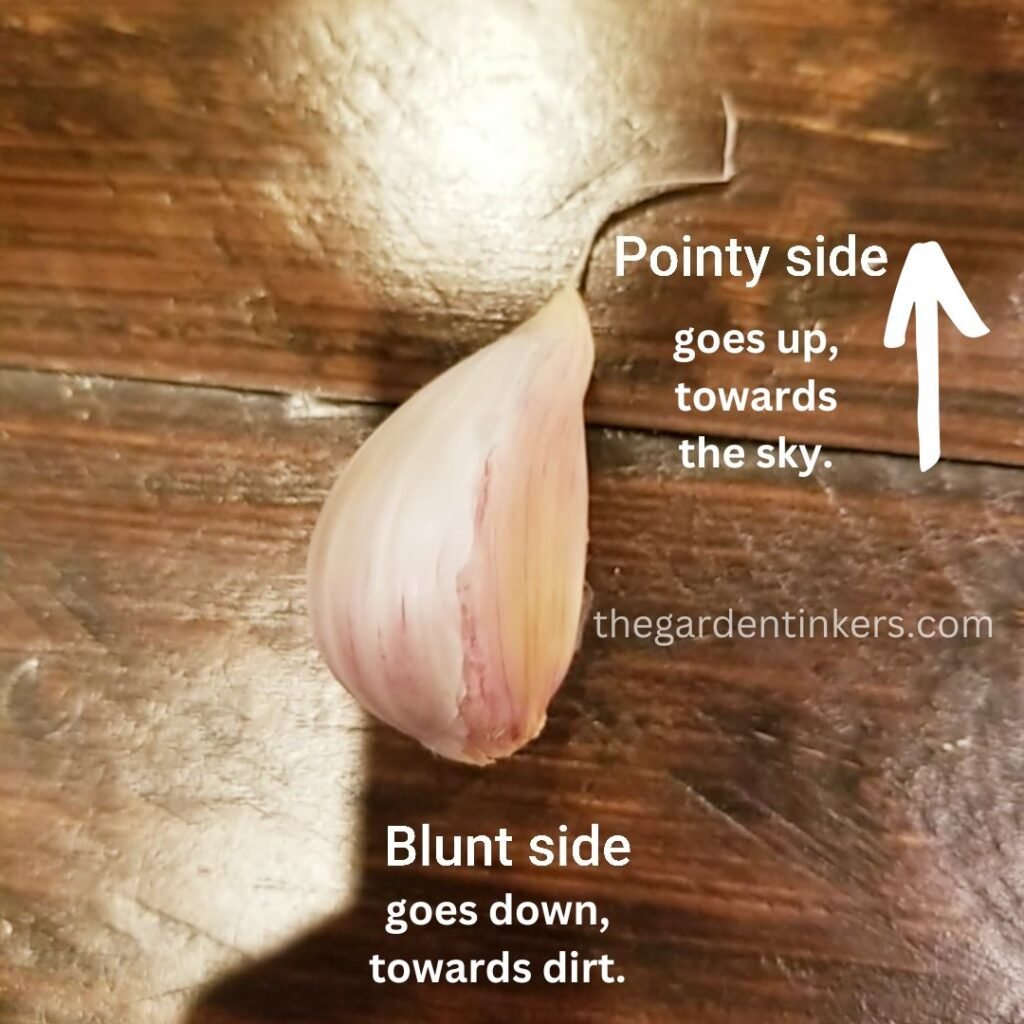
When is the BEST TIME TO PLANT garlic?
Fall is the best time to plant garlic. You want to get it in before the ground freezes. For us in Kansas, Zone 6b, we plant it in October or November. Some gardeners plant it in early spring as well, but I did not achieve success with it.
How much SUNLIGHT does garlic need?
I have a partially shaded garden, but some spots get more sunlight than others. This causes a difference in the size of the garlic. The more sun they get, the bigger they are. Aim for at least 6 hours of sunlight. I still get a decent harvest from areas where sun is hardly available for 4 hours, but the size is smaller.
How far apart should I plant garlic?
I do not have enough space to make rows of garlic. So, I pick an area of my garden and use my dibber to dig 2 inches deep holes, nearly 2 inches apart from each other to plant garlic cloves.
I have noticed that when planted further apart, for example about 3 inches away from each other, the garlic cloves grow larger in size. In my opinion 4 inches apart may be a bit of overkill, especially when you have a small garden.
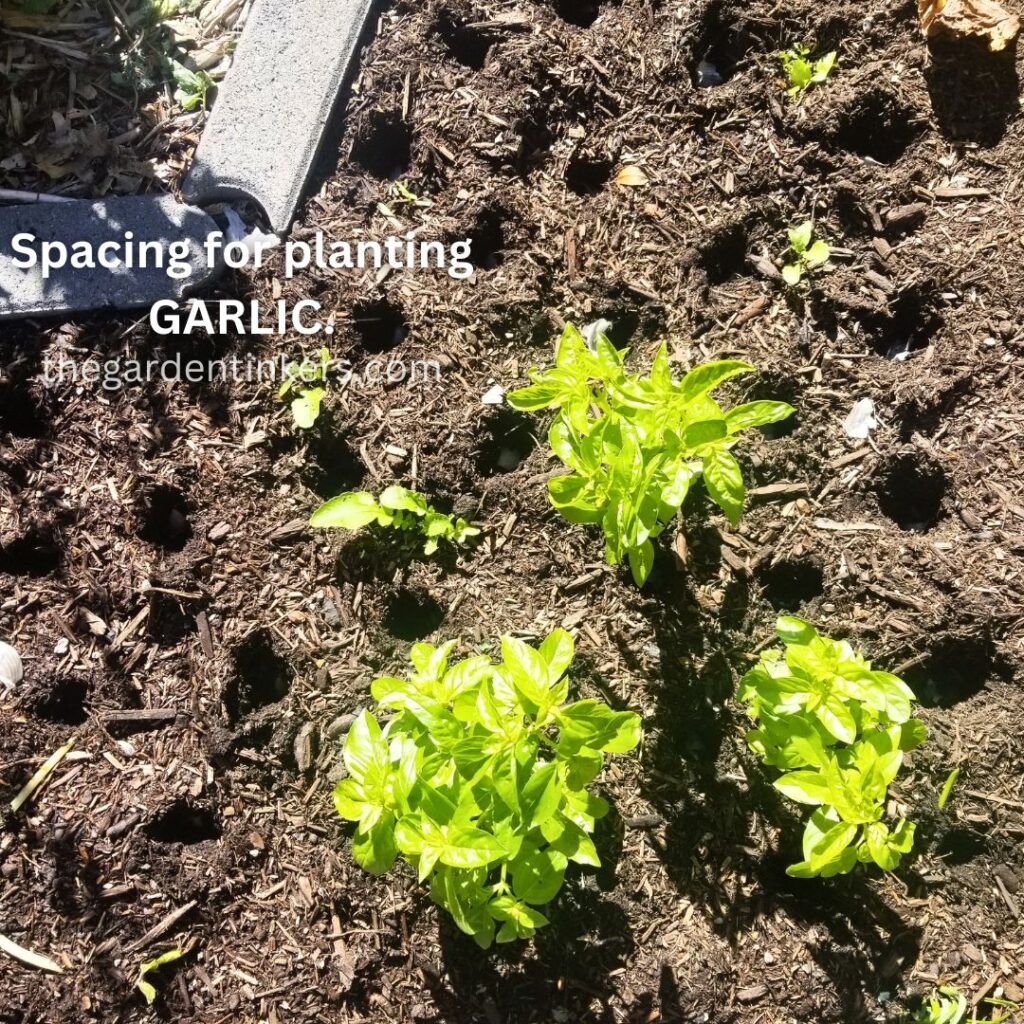
- How to grow garlic?
- How do I PLANT garlic?
- When is the BEST TIME TO PLANT garlic?
- How much SUNLIGHT does garlic need?
- How far apart should I plant garlic?
- What type of soil is best for growing garlic?
- Should I fertilize garlic?
- How do I know when garlic is ready to harvest?
- How to grow garlic in containers?
- How much water does garlic need?
- What pests and diseases affect garlic?
- How do I store garlic after harvesting?
- Can I grow garlic from store-bought garlic?
- Do I need to rotate my garlic crops?
- How to grow garlic for self-sufficiency?
- What is the difference between softneck and hardneck garlic?
- What VARITIES of garlic are best for my region? What varieties of garlic should I grow?
What type of soil is best for growing garlic?
Because garlic is a bulb, it does well when the soil is loose. It generally prefers alkaline soil, with pH between 6.0 to 7.0. Every fall I prepare the garlic bed by adding at least an inch of homemade compost, mixed with coffee grounds and sand, as shown in this budget friendly garden soil preparation video.
Should I fertilize garlic?
Yes, you should fertilize garlic. I usually use a homemade mix of compost when I plant garlic. If I am short on compost, I add a balanced organic fertilizer at planting time.
Then, in Spring, I add a high PK organic fertilizer because root crops develop better and bigger with it. Why and how? You can learn it in this video that explains when to add what kind of fertilizer to plants.
How do I know when garlic is ready to harvest?
Garlic takes about 9 months to be ready to be harvested for me, here in Kansas. I usually plant it in October and harvest it in mid-June.
The signs you should look for is when the lower 3 to 4 leaves start to turn brown, it is about time to harvest garlic. I prefer to pull one plant up to check the size, and if I am happy with it, I would harvest the rest.
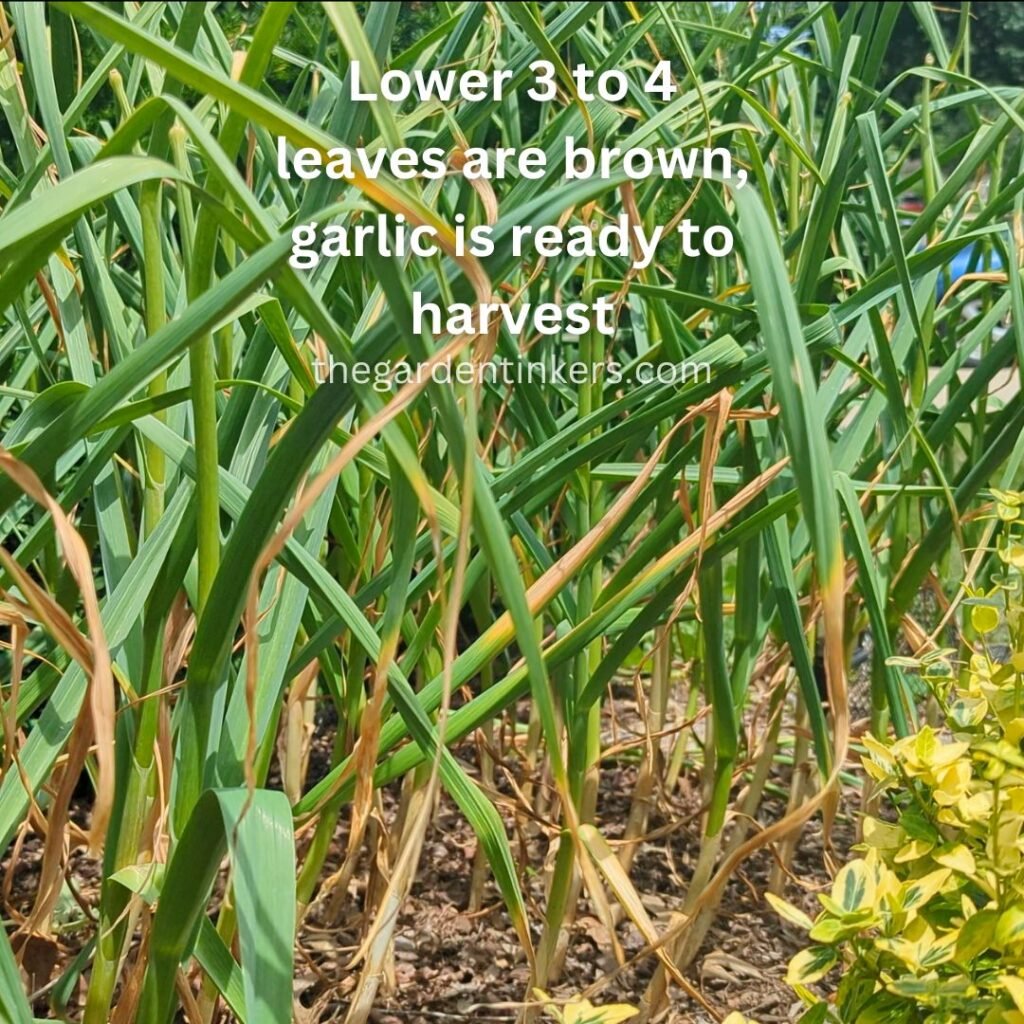
How to grow garlic in containers?
I believe the softneck variety, in milder climates can be grown easily in containers because it doesn’t run the risk of being killed by cold winter. For hardneck varieties, it is a gamble, because if the temperature drops too much, the container will not provide enough protection.
For hardneck varieties, it is a gamble, because if the temperature drops too much, the container will not provide enough protection.
One way around the cold temperatures is to store the container in garage and not forgetting to water it. I would not suggest keeping it in basement because basement is too warm than what the hardneck varieties need.
Irrespective of the variety you choose, pick a large container to grow garlic.
How much water does garlic need?
1 inch of water, once a week is good enough. I usually get enough snow & rain in my area in Spring, so I do not water garlic. Yes, you read it correct, I never watered my garlic plants. But if I notice a super dry spell, I will water it.
What pests and diseases affect garlic?
You will not find a bunny or deer eating the garlic, so it can easily be planted outside of garden fence.
The most common pests are the smaller ones. Garlic bloat nematodes and aphids, fungal diseases like white rot and downy mildew can also be an issue.
Crop rotation may help with nematodes but calling your local agriculture extension for more tips will be a better idea.
The red rust is the most common fungal infection I have come across. Cutting off the infected leaves and destroying them can help to stop the spread. It is what I do.
How do I store garlic after harvesting?
Knowing how to grow garlic is one thing, knowing how to store garlic is another. Garlic needs to be cured after harvesting by hanging them up or spreading them on floor in a cool, dry place, will good air circulation.
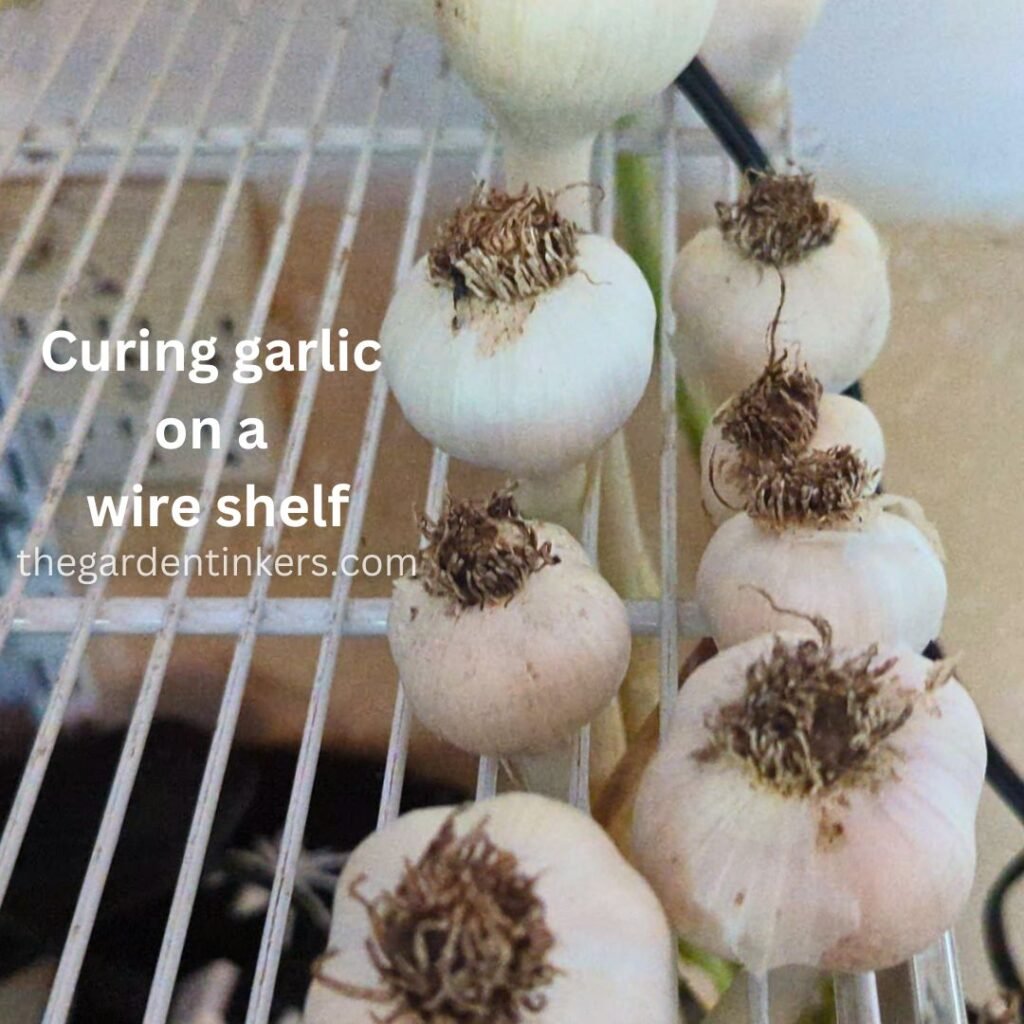
I usually bunch a few and hang them in my garage; or on the wire shelves in my garage.
After 3 to 4 weeks of curing, you can braid the softneck varieties to hand them up. Hardneck varieties do not braid well. Cutting the stems off and storing them in mesh bags or baskets, in a dark place, is the way to go.
Can I grow garlic from store-bought garlic?
Yes, you can, if you keep these points in mind.
- Softneck varieties are the most commonly available ones in store. This variety is not for colder climates.
- Store garlic may be sprayed with growth inhibitor, so buy organic.
- There possibly will be size difference when you grow store bought garlic vs garlic meant for growing.
Do I need to rotate my garlic crops?
The northeastern states in USA are affected a lot by garlic bloat nematodes. So how to grow garlic in such conditions? Crop rotation in such areas can be useful to lessen the crop destruction.
I am in Kansas, and I have not noticed such destruction to my garlic crop, and because of limited space, I have grown garlic in same spot for past 4 years.
How to grow garlic for self-sufficiency?
We use a lot of garlic for cooking, so achieving self-sufficiency in it was a pleasant experience. It was easier than what I expected. Here is how to grow garlic to achieve self-sufficiency for this crop.
- The first year we got about 16 garlic bulbs to plant, each had nearly 6 cloves; which means we planted 96 garlic plants.
- At harvest time we got an average of 4 cloves per garlic plant, so nearly 384 cloves.
- We kept 140 largest cloves to plant for next year and ate the rest.
- Since then, we are repeating these steps every year.
What is the difference between softneck and hardneck garlic?
With garlic, knowing the right type to grow in your region can make or break the deal.
Softneck Garlic:
- Bulb structure: Multiple layers of cloves, smaller cloves
- Flavor: Milder, sweeter
- Storage: Longer shelf life (up to 12 months)
- Growth Regions: Best for mild climates
- Scapes: No scapes produced
- Uses: Ideal for braiding and long-term storage
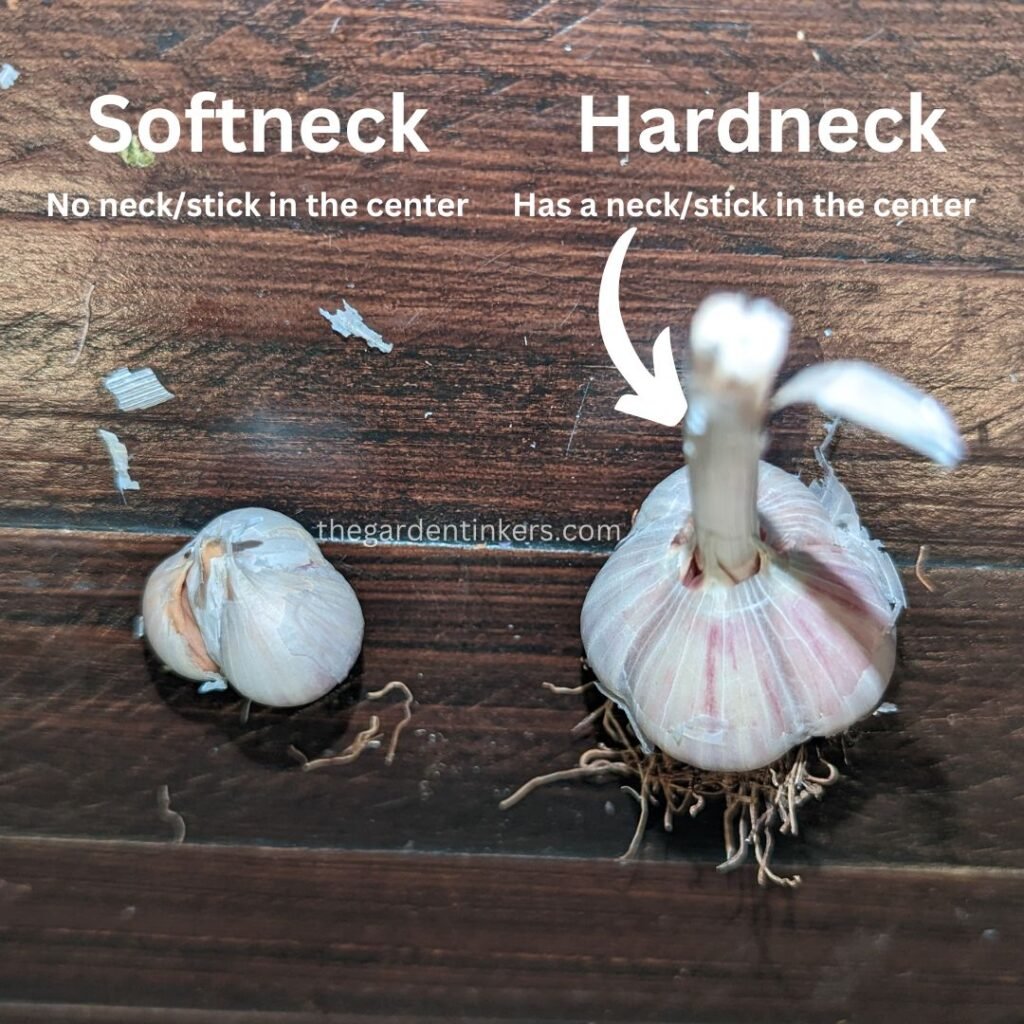
Hard neck Garlic:
- Bulb structure: Single layer of larger cloves
- Flavor: Spicier, more complex flavor
- Storage: Shorter shelf life (3 to 6 months)
- Growth Regions: Thrives in colder climates
- Scapes: Produces scapes that can be harvested
- Uses: Great for fresh use and culinary variety
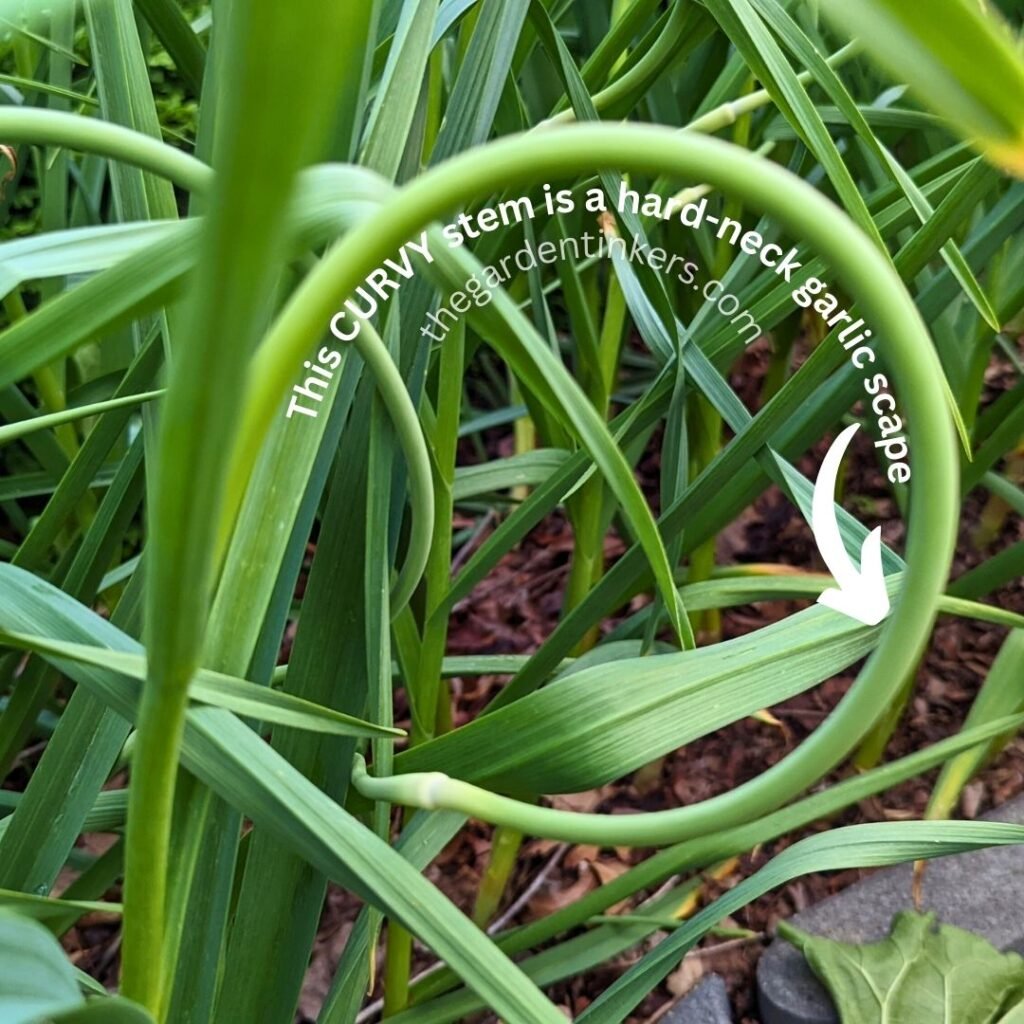
What VARITIES of garlic are best for my region? What varieties of garlic should I grow?
Now that you know how to grow garlic, it is time to find out the best garlic variety for your planting zone and state.
You can check the table below to see which type of garlic grows best in your state, softneck or the hardneck. Then look for specific variety name, for example, we are in Kansas, so hardneck variety is the one for us.
We can grow Lorz variety in Kansas, but I personally grow Music and German extra hardy because they were easily available to me.
It is a good idea of call your local agriculture extension to get a list of varieties (for any kind of plant) that do best in your area.
| US state | Plant hardiness zone | Garlic type | Best garlic variety for your region |
|---|---|---|---|
| Alabama | 7a – 8b | Softneck | ‘California Early’ |
| Alaska | 2a – 5b | Hardneck | ‘Music’ |
| Arizona | 4b – 9b | Softneck | ‘California Late’ |
| Arkansas | 6a – 8a | Hardneck | ‘Creole’ |
| California | 5a – 10b | Softneck | ‘Inchelium Red’ |
| Colorado | 3b – 7a | Hardneck | ‘Spanish Roja’ |
| Connecticut | 5a – 7a | Hardneck | ‘German White’ |
| Delaware | 6a – 7b | Hardneck | ‘Purple Stripe’ |
| Florida | 8a – 11b | Softneck | ‘Silver White’ |
| Georgia | 7a – 8b | Softneck | ‘Georgia Crystal’ |
| Hawaii | 9a – 11b | Softneck | ‘Elephant Garlic’ |
| Idaho | 3a – 7a | Hardneck | ‘Kettle River Giant’ |
| Illinois | 5a – 7b | Hardneck | ‘Music’ |
| Indiana | 5a – 7b | Hardneck | ‘Purple Stripe’ |
| Iowa | 4a – 6b | Hardneck | ‘Chesnok Red’ |
| Kansas | 5b – 7b | Hardneck | ‘Lorz’ |
| Kentucky | 6a – 7b | Hardneck | ‘German Extra Hardy’ |
| Louisiana | 8a – 9b | Softneck | ‘Texas White’ |
| Maine | 3a – 5b | Hardneck | ‘Music’ |
| Maryland | 6a – 7b | Hardneck | ‘Spanish Roja’ |
| Massachusetts | 5a – 7a | Hardneck | ‘Hardneck’ |
| Michigan | 4a – 6b | Hardneck | ‘German White’ |
| Minnesota | 3a – 5b | Hardneck | ‘Burgundy’ |
| Mississippi | 7a – 9a | Softneck | ‘California Early’ |
| Missouri | 5a – 7b | Hardneck | ‘German White’ |
| Montana | 3a – 6b | Hardneck | ‘Purple Stripe’ |
| Nebraska | 4b – 6a | Hardneck | ‘Chesnok Red’ |
| Nevada | 4b – 9b | Softneck | ‘California Early’ |
| New Hampshire | 3a – 5b | Hardneck | ‘Music’ |
| New Jersey | 6a – 7b | Hardneck | ‘German White’ |
| New Mexico | 4b – 9a | Softneck | ‘New Mexico White’ |
| New York | 3a – 7a | Hardneck | ‘German Extra Hardy’ |
| North Carolina | 6a – 8b | Softneck | ‘Southern Giant’ |
| North Dakota | 3a – 4b | Hardneck | ‘Kettle River Giant’ |
| Ohio | 5a – 7a | Hardneck | ‘Red Russian’ |
| Oklahoma | 6a – 7b | Softneck | ‘Texas White’ |
| Oregon | 4a – 9b | Hardneck | ‘Music’ |
| Pennsylvania | 5a – 7a | Hardneck | ‘German White’ |
| Rhode Island | 6a – 7a | Hardneck | ‘Spanish Roja’ |
| South Carolina | 7a – 8b | Softneck | ‘Georgia Crystal’ |
| South Dakota | 3a – 5b | Hardneck | ‘German Extra Hardy’ |
| Tennessee | 6a – 8a | Softneck | ‘Silver White’ |
| Texas | 6a – 9b | Softneck | ‘Texas White’ |
| Utah | 4a – 8a | Softneck | ‘California Late’ |
| Vermont | 3a – 5b | Hardneck | ‘Music’ |
| Virginia | 6a – 8a | Softneck | ‘Spanish Roja’ |
| Washington | 4a – 8b | Hardneck | ‘Music’ |
| West Virginia | 6a – 7b | Hardneck | ‘German White’ |
| Wisconsin | 3a – 5b | Hardneck | ‘Kettle River Giant’ |
| Wyoming | 3a – 7a | Hardneck | ‘Spanish Roja’ |
SHARE it to SUPPORT us!
